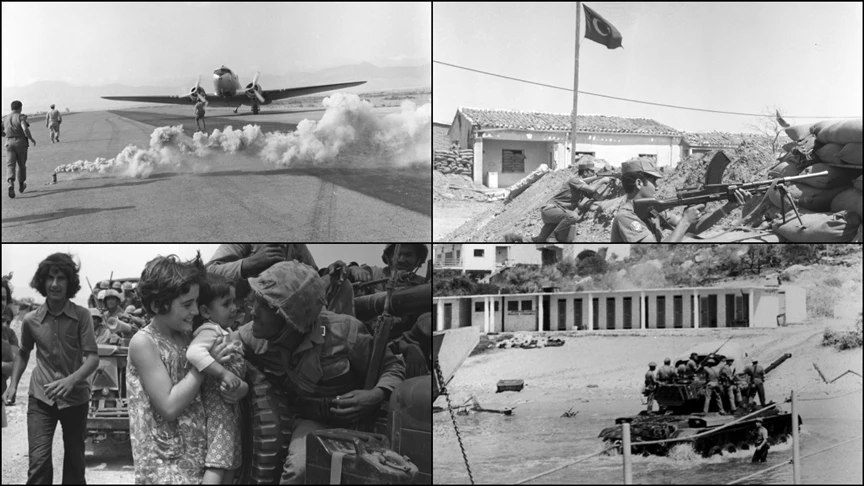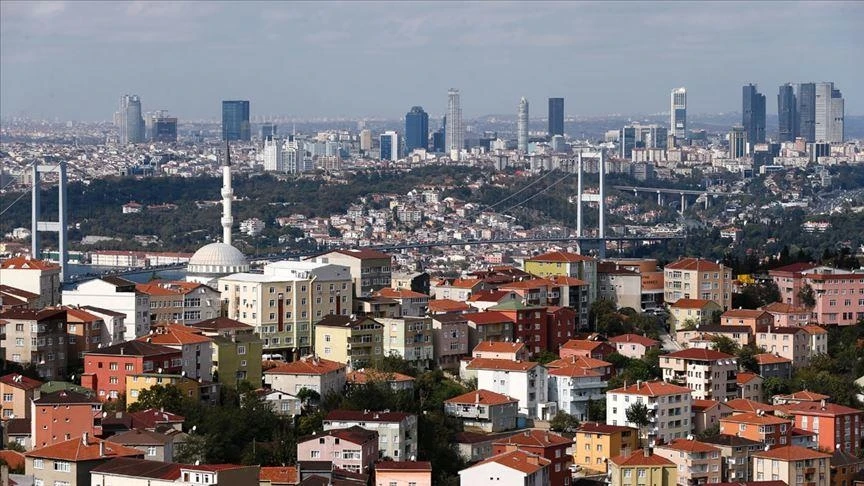Cyprus Peace Operation boosts Türkiye’s defense industry, says expert
 Turkish academician states that the Cyprus Peace Operation encouraged Türkiye to develop its defense industry. (AA Photo)
Turkish academician states that the Cyprus Peace Operation encouraged Türkiye to develop its defense industry. (AA Photo)
The Cyprus Peace Operation prompted Türkiye to establish its national defense industry, said Ankara Social Sciences University (ASBU) Turkish Republic of Northern Cyprus (TRNC) Rector professor Dr. Enver Arpa.
“The realization that the West would impose an embargo on Türkiye at the most critical time led Türkiye to produce its own defense needs,” he emphasized.
Arpa shared his evaluations on the anniversary of the Cyprus Peace Operation, which the Turkish Armed Forces (TAF) conducted to prevent the oppression and persecution of Turks by Greek Cypriots and to establish peace and tranquility on the island.
Arpa noted that the operation had many known and unknown reasons in the eyes of the global public.
He explained that the Greek National Guard, under the command of Greek officers, orchestrated various events through the EOKA-B organization to unite the island with Greece and seized control from President Archbishop Makarios III in a coup on July 15, 1974.
Emphasizing that the sole aim of the Greek officers and the EOKA-B organization was to annex the island to Greece fully, Arpa said: “Aware of this situation, Türkiye utilized its guarantor rights and intervened militarily from sea and air on July 20, 1974, to stop this attempt, which aimed to eliminate the Turkish Cypriot community, thus protecting the Turkish Cypriot people.”
Arpa mentioned that during the conflicts, the United Nations General Assembly adopted a resolution calling for the withdrawal of foreign troops from the island, and Türkiye, complying with this cease-fire decision, established the Girne-Nicosia defense line on July 22.
“Following the cease-fire, the guarantor countries attended the Geneva talks, where they accepted the administration of two autonomous entities on the island and determined the borders between the two communities,” he continued.
However, the Greek administration did not adhere to the agreement and continued massacres against the Turks.
Consequently, the Turkish Security Forces (TSK) had to launch a second operation on Aug. 14, with the code ‘Ayse should go on vacation.’ This second operation established control over the region from Famagusta to Lefka, ensuring a secure living environment for the Turkish community, the professor maintained.
Arpa further noted that the operation resulted in the deaths of 498 Turkish soldiers, including 415 from the army, 65 from the navy, five from the air force, and 13 gendarmes, while 1,200 soldiers became veterans. The Turkish Cypriot side suffered the loss of 70 soldiers, 270 civilians and 1,000 others sustained injuries.
“Throughout the struggle, Turkish Cypriots suffered 1,672 losses and thousands of injuries. The Greeks and Greek Cypriots suffered a total of 4,000 deaths and 12,000 injuries,” he added.
Diversification in Western-Oriented Foreign Policy
Arpa stated that the Cyprus Peace Operation had significant repercussions for both Turkish political history and global politics.
He emphasized that the most crucial outcome for Türkiye was its clear demonstration to the world that it would steadfastly protect its rights under international law and the rights of the Turkish Cypriot people.
Evaluating the broader impact, Arpa noted: “The U.S. and its allies imposed an embargo on Turkey and supported the Greek side. This situation presented Turkey with an opportunity to explore new directions in its foreign policy.”
Previously, Türkiye’s foreign policy was predominantly Western-oriented. However, this shift led to greater diversification, with Türkiye beginning to cooperate with Middle Eastern, Islamic and other global partners across various fields, the professor said.
Arpa also opined that the Cyprus Peace Operation also drove Türkiye to advance its national defense capabilities. Faced with the potential for a Western embargo, Türkiye took steps to develop its defense industry.
“As a result, Türkiye now achieves approximately 80% domestic production in this sector,” the professor added.
‘Operation ensured true peace on island’
Professor Dr. Arpa noted that the operation revealed that the dream of Enosis, which the Greek side had harbored for years, was impossible, demonstrating to the world that Türkiye would never allow Enosis.
Arpa mentioned that the Cyprus Peace Operation brought Türkiye and the U.S. into conflict, with the U.S. imposing military and economic sanctions on its ally Türkiye, which significantly impacted bilateral relations.
He said that through this operation, Türkiye had the chance to see the true nature of its friends and allies.
Evaluating the operation as a significant turning point in Türkiye-EU relations, Arpa stated: “As a result of efforts by Greek and Greek Cypriot lobbies, the EU also took various decisions against Türkiye and admitted the Greek Cypriot side as a member despite not meeting the conditions. Despite these negativities, the Cyprus Peace Operation ensured true peace on the island. Since the operation, there has been no conflict on either side.”
Arpa emphasized that Turkish Cypriots, who found the opportunity to live sovereign and free with the operation, would never compromise their freedom and that the only way to achieve lasting peace on the island is to accept them as an equal and sovereign community.
‘TRNC holds importance in Türkiye’s Mediterranean security architecture’
Arpa emphasized that TRNC territory is the only land that the Ottomans lost and the Republic era reclaimed.
He stressed that the island’s strategic location has made it a constant area of competition throughout history: “Due to its strategic position for transferring and dominating energy resources, the island’s significance has increased further today.” Its role in regional politics is vitally important for Türkiye.”
The professor went on to add that with the natural gas crisis arising from the Russia-Ukraine war, all attention has turned to the Mediterranean, which holds significant potential.
The competition and polarization in the region pose serious threats to Mediterranean basin security and global peace, he added.
“Cooperating with a country within Mediterranean geopolitics will strengthen Turkey in every aspect. In this context, the TRNC holds a vital position in Turkey’s Mediterranean security architecture,” he concluded.



